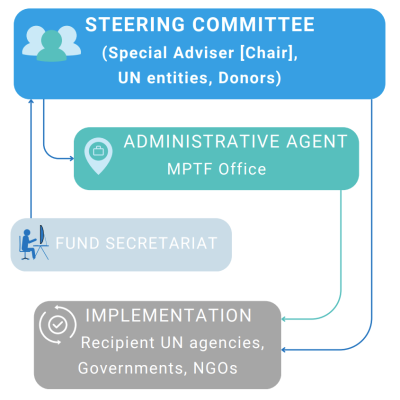Objectives
Fund scope
By the end of 2022 over 71 million people were internally displaced across 110 countries and territories. The majority, who live in camps and crowded urban settlements, were forcibly displaced from their homes by political conflict, ethnic and religious clashes, economic inequality, and climate and man-made disasters. Millions of internally displaced people (IDPs) face poor or no social services access, declining health and nutritional standards, food insecurity, widespread violence and violations of human rights, disruption of livelihoods and lack access to basic services.
Sustainable solutions for IDPs must go beyond what current crisis and humanitarian responses offer. New approaches should integrate development, humanitarian, peacebuilding, human rights, disaster risk reduction and climate components. Durable solutions require stakeholders, from national and local authorities to humanitarian, peace and development actors, to invest in development plans and action that is inclusive, localized, and coherent.
The Internal Displacement Solutions Fund (IDSF) supports strategic, collaborative and comprehensive engagement of United Nations country teams (UNCTs) under the leadership of Resident Coordinators in managing IDP-centred initiatives aligned with national priorities, the 2030 Agenda, and SDG achievement. IDSF priorities address causes of protracted internal displacement, ways of improving coherence and coordination in programming multi-dimensional solutions, and piloting methods of rapidly advancing IDP strategies and scaling them accordingly.
IDSF stakeholders provide financing to leverage impact through:
- Multi-sector, SDG-aligned and IDP-informed strategies that accelerate development planning and humanitarian responses for internally displaced people.
- Leveraging a whole-of-UN response using accountability frameworks and joint coordination mechanisms where peacebuilding, social cohesion, legal identity and economic inclusiveness are foundational elements.
- Deploying financing frameworks that link IDP solutions to long-term development planning and financing that is evidence-based.
In line with the UN Secretary General’s Action Agenda on Internal Displacement, the fund promotes national leadership and strategies that are fully inclusive in addressing the needs of IDPs, as well as leaving no one behind and respecting national SDG plans. Moreover, IDSF stakeholders support joint assessments, provide seed funding, pilot innovative solutions, support local partners in driving policy, legal, and institutional change.
Strategic action and theory of change
Investments to IDSF support holistic, cross-sector approaches tailored to local realities. Programmes respond to specific barriers IDPs face in each location, as identified through analyses, strategies, and costed plans. Solutions are age and gender sensitive and involve the meaningful engagement of IDPs and host communities, including internally displaced women and children, for their design and realization. The main instrument are the joint programmes designed and implemented by the UN at the country level. Joint programme design is predicated on the principle that results are to be delivered through Cooperation Framework outcomes, national development priorites related to SDGs, and one or more policy levers that can support widespread systems change.
The IDSF focus on joint UN action helps the UN develop systemic responses that simultaneously address policy, capacity, and connectivity needs for transformative results. At the country level, the UN brings to the table an ability to draw from global expertise in terms of solutions that are transformative and successful in the areas of social protection, agriculture, climate adaptation and mitigation, early warning systems, food security, structural transformation, and others.





